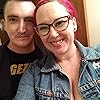Joey
asked
Sarah Pinsker:
You have an excellent spread of short fiction published in some very good magazines and collections. Might I ask, what was your breakthrough into short fiction like? How did you get published (in your experience.)
Sarah Pinsker
Hi Joseph,
Thanks for asking!
I'm not sure there's much to my 'how did you get published' story beyond saying that I wrote a story somebody wanted to publish.
On paper, my breakthrough into short fiction was on the fast side, if you're just looking at stories published. My first pro sale was to Daily Science Fiction, and then several months later things took off with pro sales to Strange Horizons, Asimov's, etc. and many more since then.
On the other hand, I'd been submitting stories to magazines since I was fourteen, with a break when I was playing music full time. Things went fast once they got rolling in 2012, but I had lots of stories under my belt by then.
In my opinion, the only way to get published is to write, write, write and submit, submit, submit. Finish stories, then finish more stories. That sounds glib, but I used to start stories all the time and then abandon them. Some people swear by a stint slush reading at magazines, and others swear by attending one of the genre workshops (Clarion being the gold standard, but there are other shorter/more affordable ones such as Viable Paradise and the one at the University of Kansas). I'll just swear by writing a lot, submitting a lot, and rolling with the rejections until they turn into acceptances.
Thanks for asking!
I'm not sure there's much to my 'how did you get published' story beyond saying that I wrote a story somebody wanted to publish.
On paper, my breakthrough into short fiction was on the fast side, if you're just looking at stories published. My first pro sale was to Daily Science Fiction, and then several months later things took off with pro sales to Strange Horizons, Asimov's, etc. and many more since then.
On the other hand, I'd been submitting stories to magazines since I was fourteen, with a break when I was playing music full time. Things went fast once they got rolling in 2012, but I had lots of stories under my belt by then.
In my opinion, the only way to get published is to write, write, write and submit, submit, submit. Finish stories, then finish more stories. That sounds glib, but I used to start stories all the time and then abandon them. Some people swear by a stint slush reading at magazines, and others swear by attending one of the genre workshops (Clarion being the gold standard, but there are other shorter/more affordable ones such as Viable Paradise and the one at the University of Kansas). I'll just swear by writing a lot, submitting a lot, and rolling with the rejections until they turn into acceptances.
More Answered Questions
Kayla
asked
Sarah Pinsker:
So, in A Song For A New Day, you say they have underground "rock" shows... but this story is punk as fuck. Was that your intention? There was such a great DIY punk vibe to this disturbingly timely story, and I did not expect such huge punk energy when I picked up this book. Bravo! Also related, do you have any music/performing or industry experience? This book felt so real.
Jo
asked
Sarah Pinsker:
Sarah, I've recently read N. K. Jemisin's The Ones who stay & fight, and in discussing it with a friend, discovered that you previously wrote "The Ones Who Know Where They Are Going,” your own response to LeGuin's classic short story. I no longer have my old issues of Asimov's magazine. Where might I find a copy of this story to read? Thank you so much
About Goodreads Q&A
Ask and answer questions about books!
You can pose questions to the Goodreads community with Reader Q&A, or ask your favorite author a question with Ask the Author.
See Featured Authors Answering Questions
Learn more





